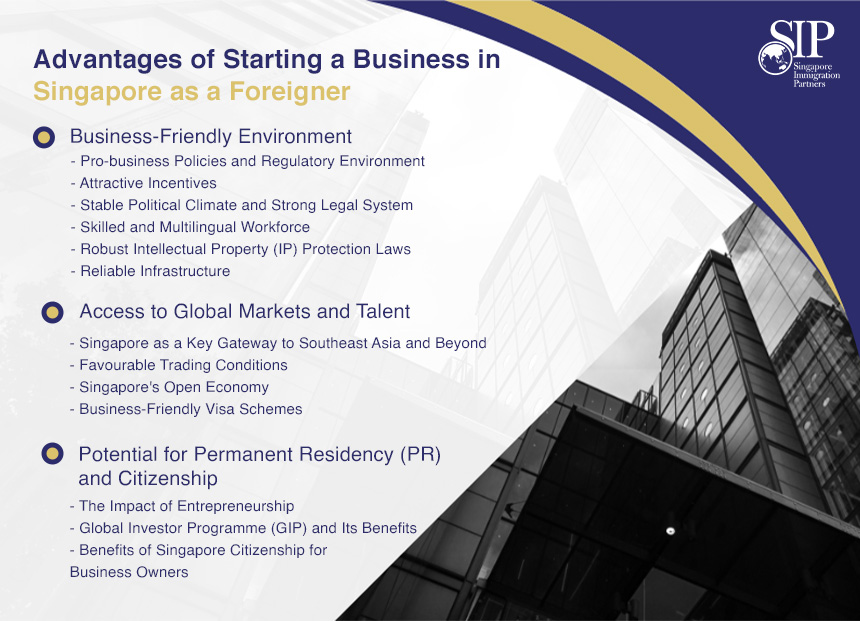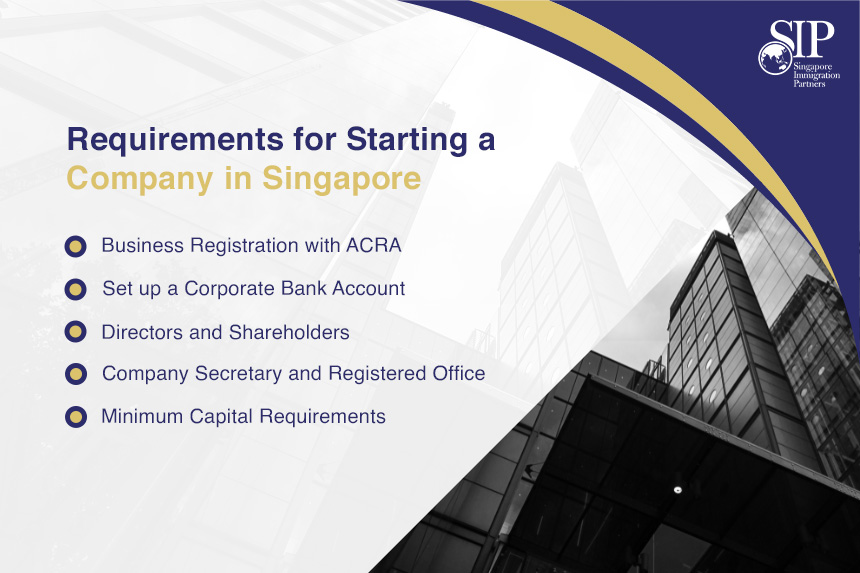Starting a business in Singapore as a foreigner is an attractive opportunity due to the country’s business-friendly environment, strategic location, and robust infrastructure. With low corporate taxes, access to global markets, and a stable political climate, Singapore offers a range of business structures and supportive policies for foreign entrepreneurs.
In this guide, we’ll explore the key advantages of starting a business in Singapore, the various business entities available, and the requirements for setting up your venture successfully.
Advantages of Starting a Business in Singapore as a Foreigner

Business-Friendly Environment
1. Pro-business Policies and Regulatory Environment
Singapore boasts an efficient and transparent regulatory system that supports entrepreneurship and attracts foreign investment. In fact, with all the necessary documents in order, applications can be approved by ACRA (Accounting and Corporate Regulatory Authority) within 1 to 3 business days. The government’s streamlined business setup minimises the bureaucratic hurdles that often stifle new ventures in other countries. This greatly simplifies the business setup process in Singapore, allowing foreign entrepreneurs to focus on growing their businesses.
2. Attractive Incentives
Singapore also has a favourable tax regime, with corporate tax benefits capped at a competitive 17%—an appealing rate for foreign entrepreneurs looking to maximise their profits. Furthermore, startups can enjoy specific tax exemptions during their initial years of operation. This includes the Start-up Tax Exemption Scheme (SUTE), which provides substantial tax breaks on the first SGD 100,000 of chargeable income for new businesses. This financial incentive greatly enhances the attractiveness of establishing a business in Singapore, as it allows foreign entrepreneurs to reinvest savings back into their ventures.
3. Stable Political Climate and Strong Legal System
A predictable political climate fosters a sense of security and allows foreign entrepreneurs to operate without fear of sudden regulatory changes or civil unrest. Complementing this is a robust and impartial legal system that protects business interests and resolves disputes fairly.
This legal framework instills confidence, as business owners know that their rights and investments are safeguarded.
4. Skilled and Multilingual Workforce
Singapore’s biggest and greatest resource is its people, and the island city is home to a pool of professionals with multilingual capabilities. This is particularly valuable for businesses interested in operating in the Asia-Pacific region. Moreover, Singapore’s commitment to education and workforce training ensures businesses can find skilled employees across various industries. This large and diverse pool of trained talent supports operational needs while driving innovation and competitiveness.
5. Robust Intellectual Property (IP) Protection Laws
Singapore ranks among the top countries globally for intellectual property (IP) protection, with comprehensive IP protection laws encompassing patents, trademarks, and copyrights. This offers foreign entrepreneurs strong legal backing to protect their creations. Additionally, it encourages business owners to invest in research and development (R&D), knowing that their intellectual property will be well protected.
6. Reliable Infrastructure
Businesses can benefit from Singapore’s world-class infrastructure, including the latest technology, secure banking services, and an efficient transport system. The country’s advanced telecommunications and internet services enable both local and international connectivity, supporting daily business activities and enhancing overall operational efficiency.
Access to Global Markets and Talent

1. Singapore as a Key Gateway to Southeast Asia and Beyond
The city-state is situated at the crossroads of major trade routes, allowing businesses to reach the ASEAN markets as well as larger economies such as China, India, and Australia. This central location facilitates trade and serves as a logistical hub for multinational corporations (MNCs) aiming to establish a presence in the broader Asia-Pacific region.
2. Favourable Trading Conditions
Singapore has established extensive Free Trade Agreements (FTAs) with numerous countries across Asia, Europe, and the Americas, providing tariff-free access to multiple markets. The agreements help reduce trade barriers, streamline customs procedures, and simplify the movement of goods and services, making it easier for companies to expand their operations internationally. As a result, foreign entrepreneurs can penetrate new markets more efficiently and enjoy a smoother pathway for export and import activities.
3. Singapore’s Open Economy
The government’s progressive policies welcome global professionals and foster a culture of collaboration and innovation. More importantly, this enables businesses to tap into a diverse talent pool with specialised skills in various fields. This, alongside strong government support for education and training, allows companies to stay competitive and adaptable. Moreover, the collaborative atmosphere encourages local and international entities to share knowledge and form partnerships, further driving advancements within the region.
4. Business-Friendly Visa Schemes for Hiring Foreign Employees
Singapore also offers a range of business-friendly visa schemes designed to facilitate the hiring of skilled talent. Among these, the Employment Pass (EP) and S Pass are particularly noteworthy.
The EP caters to professionals and executives, allowing foreign entrepreneurs to bring in top-tier talent to fill essential leadership roles. Meanwhile, the S Pass is aimed at mid-level skilled workers, enabling businesses to hire the necessary talent to keep operations efficient. These business visa schemes for foreigners are instrumental in building strong teams and driving growth for businesses in Singapore.
Learn more: Singapore Employment Pass Scheme: What You Need To Know
5. Government Support for Innovation and R&D Grants
Various grants and incentives for R&D, particularly in key sectors such as technology, healthcare, and finance, promote innovation. Initiatives like the Research Innovation Enterprise 2025 Plan (RIE2025) assist in developing the latest products and solutions. These programmes provide financial support and create an ecosystem that nurtures creativity and technological advancement. With an environment where innovation thrives, foreign entrepreneurs can stay competitive, accelerate growth, and contribute to the nation’s reputation as a global innovation hub.
Potential for Permanent Residency (PR) and Citizenship

1. How Entrepreneurship Boosts Your PR Application
Establishing a business in Singapore is not only a pathway to professional success but also a step toward gaining Permanent Residency (PR). By starting a business, contributing to the local economy, and investing in local talent, foreign entrepreneurs demonstrate their long-term commitment to the country. This active involvement solidifies their case for PR, as creating jobs, investing in local talent, and enhancing the overall economic landscape provide tangible value to Singapore.
In addition, a strong business track record further enhances the likelihood of securing PR and, eventually, citizenship. Business success reflects financial stability as well as integration into Singapore society, both critical factors in PR evaluations.
2. Global Investor Programme (GIP) and Its Benefits
The Global Investor Programme (GIP) is an initiative designed to attract foreign investors and business owners who wish to apply for PR in Singapore. Under the GIP, applicants are required to invest a significant amount in local companies or funds, ensuring that their investment contributes to the growth of the Singaporean economy.
One of the major benefits of the GIP is the expedited PR application process for eligible business owners, making it an attractive option for high-net-worth individuals looking to settle in Singapore. Entrepreneurs who qualify under this programme can thus enjoy a more straightforward pathway to residency, and engage with Singapore’s business landscape.
3. Benefits of Singapore Citizenship for Business Owners
Singapore citizenship offers many benefits, especially for business owners. For one, citizenship grants access to various government funding schemes and tax reliefs specifically designed to support local entrepreneurs. As citizens, business owners can actively participate in government tenders, gaining opportunities to secure contracts and partnerships often reserved for local entities.
Additionally, Singaporean citizens enjoy lower tax rates on profits, providing a substantial financial incentive to operate within the country. Citizenship also simplifies access to local banking and credit facilities, enabling foreign entrepreneurs to obtain financing more readily and enhance their operational capacity. Ultimately, Singaporean citizenship equips them with the necessary tools and resources to thrive in the competitive business environment.
Types of Business Entities and Requirements to Set Up a Business in Singapore

Foreign entrepreneurs have several options when choosing a business structure in Singapore, each with unique features and benefits. Here are some of the most common types.
1. Sole Proprietorship
The most straightforward business structure would be a sole proprietorship. Here, the individual owner has complete control and is solely responsible for the business’s operations. This structure is easy to set up and requires minimal administrative work, which makes it particularly appealing for small businesses or sole traders.
However, if the business incurs debts or faces legal issues, the owner’s personal assets, such as your home or savings, can be used to settle those liabilities. This aspect poses a higher risk, particularly if the business faces financial difficulties.
2. Private Limited Company (Pte Ltd.)
The Private Limited Company (Pte Ltd.) is the most popular choice among foreign entrepreneurs looking to establish a presence in Singapore. Under this structure, shareholders are only liable for the company’s debts up to the amount of their investment. This protects them from losing personal assets. Additionally, Pte Ltd companies enjoy significant tax advantages, including lower corporate tax rates and eligibility for various tax exemptions and incentives.
A disadvantage, however, is that operating a Private Limited Company involves more regulatory requirements, such as appointing a company secretary and filing annual returns. This can increase administrative tasks and manpower costs.
3. Branch Office
A branch office is an extension of a foreign company that allows it to conduct business activities in Singapore while remaining legally part of the parent company. Businesses looking to enter the Singapore market without forming a separate legal entity may benefit from this structure. For one, it is an easy and cost-effective way for established businesses to enter the Singapore market. Additionally, branch offices can leverage the parent company’s reputation to attract customers and establish credibility.
This also means that the parent company is responsible for all liabilities incurred by the branch office, meaning that financial risks can directly impact the parent company’s financial standing. Moreover, the branch office must adhere to the policies and practices of the parent company, resulting in limited operational flexibility.
4. Subsidiary
A subsidiary is a separate legal entity formed in Singapore, with the foreign parent company as the majority shareholder. This structure enables the parent company to limit its liabilities while still benefiting from local business incentives. It also benefits from various local tax incentives, making it a financially viable option for foreign entrepreneurs. Subsidiaries also have the independence to tailor their operations to the local market and enjoy greater flexibility in decision-making.
Nonetheless, establishing a subsidiary involves more extensive registration processes, compliance requirements, and ongoing administrative responsibilities compared to other structures. It also comes with higher operational costs due to the need for separate accounting, legal, and regulatory compliance.
Requirements for Starting a Company in Singapore

To successfully establish a business in Singapore, foreign entrepreneurs must fulfill specific requirements to ensure compliance with local regulations. The key steps include:
1. Register Business with ACRA
The first step in the business setup process is registering with the Accounting and Corporate Regulatory Authority (ACRA). First, choose a unique name that does not infringe on existing trademarks. It must also comply with ACRA’s naming guidelines, which prohibit names that are vulgar or offensive.
Next, select the appropriate business structure (e.g., Private Limited Company, Sole Proprietorship) and complete the registration online. This process generally requires the submission of details such as the company’s registered address and particulars of its directors and shareholders. The business will also need to appoint a resident director.
2. Set up a Corporate Bank Account
After registration, set up a corporate bank account in Singapore to manage business finances and transactions. Most banks offer accounts specifically for startups and SMEs (Small and Medium-sized Enterprises). Opening this account will require proof of the business’s registration with ACRA, proof of the director’s identity, and other supporting documentation such as a business plan and financial projections.
3. Directors and Shareholders
Every company in Singapore must adhere to specific requirements regarding directors and shareholders. For example, every Singapore company must appoint at least one resident director who is either a Singapore citizen, Permanent Resident, or holder of an EntrePass or Employment Pass. As for shareholders, full foreign ownership is allowed in most cases, with flexibility in structuring shares.
4. Company Secretary and Registered Office
According to Singapore law, a qualified company secretary must be appointed within six months of incorporation. The secretary must be a resident of Singapore and have relevant qualifications. Additionally, businesses must maintain a physical address in Singapore, which will serve as the official company office for receiving legal documents and correspondence.
5. Minimum Capital Requirements
For a Private Limited Company, the minimum paid-up capital required for registration is just SGD 1. This flexibility allows startups to establish their businesses with minimal financial burden while offering opportunities for future capital expansion. However, certain sectors, such as travel agencies and public accounting firms, may have higher capital requirements.
Obtaining the Necessary Work Passes and Permits

Finally, foreign entrepreneurs must secure the necessary work passes and permits in order to operate legally in Singapore.
1. EntrePass
The EntrePass is a work pass specifically designed for foreign entrepreneurs with innovative business ideas to start and operate a business in Singapore. Applicants must meet specific Singapore PR requirements, such as owning intellectual property, securing funding from recognised investors, or collaborating with research institutes. The pass is also renewable based on business performance, which means that entrepreneurs can continue their ventures as they grow.
2. Employment Pass (EP)
The Employment Pass is aimed at professionals, including business owners who establish a Private Limited Company. To apply for an EP, business owners must appoint themselves as Directors or Managers. However, they will need to meet the salary and qualification criteria set by the Ministry of Manpower. Additionally, holders can bring their family members to Singapore through Dependant’s Passes and Long-Term Visit Passes.
3. Overseas Networks & Expertise (ONE) Pass
The ONE Pass is a recent initiative designed to attract top global talent and entrepreneurs. It is open to highly accomplished entrepreneurs, business leaders, and those with a proven track record in business, research, or innovation. Applicants must demonstrate an annual income of SGD 360,000 or higher or have exceptional achievements in their field.
Unlike other passes, the ONE Pass is not tied to a single employer, allowing holders to run multiple businesses and engage in various economic activities. It also provides easier access to the Dependant’s Pass and Long-Term Visit Pass, allowing family members to join the holder in Singapore.
To determine the most suitable work pass for your business needs, it’s best to consult a PR application agency in Singapore for personalised guidance on eligibility, requirements, and the application process.
Frequently Asked Questions
1. Can a foreigner start a business in Singapore without PR?
Yes, you can. You don’t need to be a Permanent Resident (PR) to start a business in Singapore. As a foreigner, you can incorporate a company and own 100% of the shares. However, you will need to appoint at least one resident director who is either a Singaporean, PR, or someone holding an EntrePass or Employment Pass. Many foreign entrepreneurs choose to set up a Private Limited Company, as it offers flexibility and limited liability.
2. What’s the best business structure for a foreign entrepreneur?
The most popular choice for foreign business owners in Singapore is the Private Limited Company (Pte Ltd). It provides limited liability, protects your personal assets, and allows for 100% foreign ownership. Additionally, it’s easier to raise capital, and there are tax incentives available for startups. Other structures like a sole proprietorship or a Limited Liability Partnership (LLP) can work for smaller ventures. Still, they may not offer the same benefits in terms of liability protection and long-term growth.
3. Do I need to be physically present in Singapore to start a business?
No, you don’t need to be physically present in Singapore to start a business. You can register a company remotely through Singapore’s online system. However, you will need a local resident director, and it may be easier to manage your operations and open a corporate bank account if you’re physically present at some point. If you plan to actively run the business in Singapore, applying for an EntrePass or Employment Pass would be a good idea.
4. What is the Global Investor Programme (GIP), and how can it help me?
The Global Investor Programme (GIP) is a scheme that offers entrepreneurs and investors an easier pathway to Singapore Permanent Residency (PR). To qualify, you need to invest a significant amount in a new or existing Singaporean business or a GIP-approved fund. This programme is ideal for high-net-worth individuals looking to settle in Singapore while growing their businesses. The GIP provides direct PR status for you and your family, making it a great option if you’re serious about long-term investment in Singapore.
Conclusion
All in all, starting a business in Singapore as a foreign entrepreneur opens doors to incredible growth opportunities. While the process may seem complex, from choosing the right business entity to meeting local requirements and exploring visa options, the potential rewards make it a worthwhile endeavour.
If you’re looking to establish your business in Singapore, Singapore Immigration Partners can provide valuable guidance and support. Our expertise in both business setup and immigration matters can help ensure a smooth transition into the local market while maximising your chances of securing permanent residency.
Contact us today to learn more.

